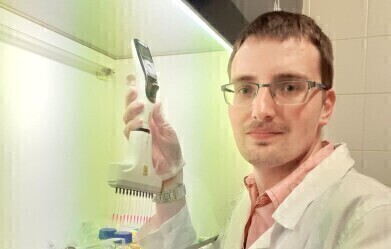-
 Dr Martin Bartas uses an Integra VOYAGER multichannel pipette to perform DNA and protein extractions.
Dr Martin Bartas uses an Integra VOYAGER multichannel pipette to perform DNA and protein extractions.
Laboratory Products
Uncovering the role of the genome in disease prevention
Mar 13 2023
The field of genomics has grown exponentially over the last twenty years, largely due to the rapid development of methods like NGS, making DNA sequencing accessible to smaller institutions and not just large genome centres. Genomics in the area of healthcare examines the molecular mechanisms of gene regulation and their interplay with the DNA of other organisms – such as plants, vectors and pathogens – as well as helping to characterise environmental factors that play a role in disease, and to predict the efficacy of health interventions. Bioinformatic analyses of genome and transcriptome data therefore represents the starting point of crucial downstream research within medicine and biotechnology.
Investing in the future of disease management
Scientists in the Department of Biology at the University of Ostrava in the Czech Republic are employing bioinformatic genome analysis to study a broad range of topics, encompassing biological diversity, evolution ecology, and the genotoxicity of environmental contaminants. Of particular interest to public health is the team’s research into the functional genomics and molecular biology of various human pathogens and diseases. The group applies a powerful combination of molecular, biophysical and bioinformatics methods to study the occurrence, structure and function of noncanonical structures of nucleic acids – such as four-stranded G-quadruplexes, left-handed Z-DNA and DNA cruciform – across the genomes of living organisms and viruses, as well as their interaction with human proteins that bind to these noncanonical structures, like p53 and topoisomerase II. Their goal is to gain insights into the mechanism of these complex protein-DNA interactions, and shed more light on their role in the progression of severe diseases like cancer and neurodegeneration. This understanding could eventually inform the selection of noncanonical structures with high therapeutic or biotechnological potential for further study, with the overall aim of developing new therapies for numerous medical conditions.
Innovative lab tools for high quality results
As part of this vital research, the team manually extracts and isolates DNA, RNA and proteins from recombinant bacteria and plants – including thale cress (Arabidopsis thaliana) and barley (Hordeum vulgare) – processing over 100 individual samples a day in replicate. This multi-stage process involves the transfer of DNA, RNA or protein isolations between 96 well qPCR or microtitration plates and 1.5 ml microtubes, using a 12 channel 50 μl VOYAGER adjustable tip spacing pipette from Integra Biosciences. The team also uses this pipette to rapidly fill qPCR plates with master mix preparations, with the tip spacing feature making it possible to fill an entire 96 well plate in just 15 minutes, in comparison with the hour it normally takes without a scalable pipette. This 75% time saving allows the lab to process significantly more qPCR plates per hour, increasing its throughput and releasing staff for other vital tasks, streamlining the whole extraction process and improving productivity.
The VOYAGER is used in conjunction with Integra’s ECO Rack GRIPTIP pipette tips, which do not leak or slip off the pipette, reducing downtime and further speeding up the lab’s liquid handling workflows. Users have also found the pipette to be incredibly ergonomic and intuitive, with a sharp, easily readable screen presenting many useful set-up options for various aspects of the pipetting workflow, including dilutions, reverse pipetting, multiple aspirations, and serial dilutions. Since adopting these new Integra products, researchers have observed smaller deviations between technical replicates than with other pipetting options, providing peace of mind and reassurance that their results are extremely accurate and reliable. The VOYAGER pipettes and GRIPTIP pipette tips have proven to be a worthy investment for the group, supporting their vital investigations into the complex roles of the genome and protein-DNA interactions in the progression of severe medical conditions.
A promising technique for supporting public health
Genomics is still a relatively new area of science, despite the numerous recent and ongoing advances in sequencing technologies, so its full potential for improving healthcare has yet to be revealed. However, it is quickly becoming clearer that studying the human genome presents a unique avenue for the discovery of new approaches to the prevention and management of many common diseases, and may ultimately contribute greatly to reducing the global burden of healthcare.
Digital Edition
ILM 49.5 July
July 2024
Chromatography Articles - Understanding PFAS: Analysis and Implications Mass Spectrometry & Spectroscopy Articles - MS detection of Alzheimer’s blood-based biomarkers LIMS - Essent...
View all digital editions
Events
Jul 28 2024 San Diego, CA USA
Jul 30 2024 Jakarta, Indonesia
Jul 31 2024 Chengdu, China
ACS National Meeting - Fall 2024
Aug 18 2024 Denver, CO, USA
Aug 25 2024 Copenhagen, Denmark
-(1)-(1).jpg)


24_06.jpg)













